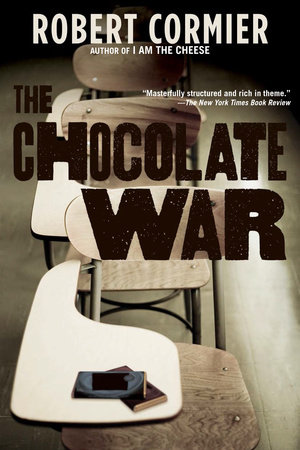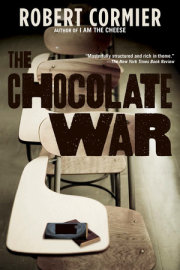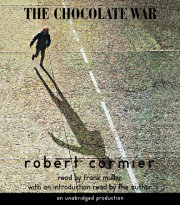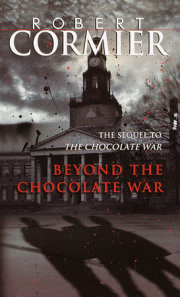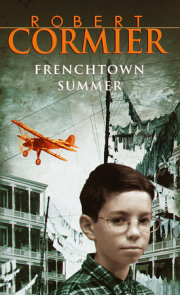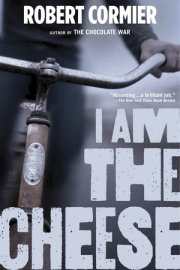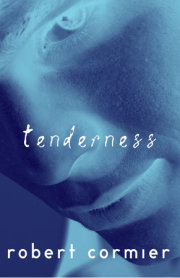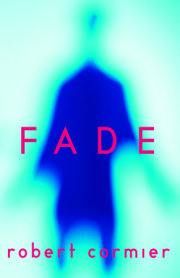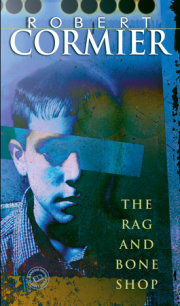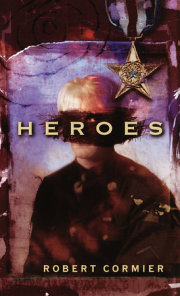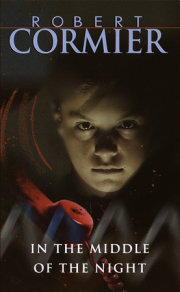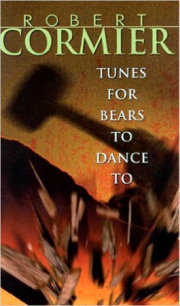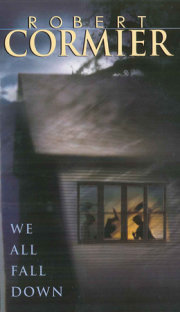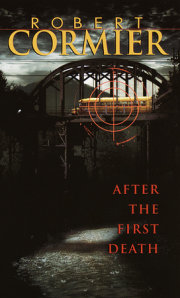THEY MURDERED HIM.
As he turned to take the ball, a dam burst against the side of his head and a hand grenade shattered his stomach. Engulfed by nausea, he pitched toward the grass. His mouth encountered gravel, and he spat frantically, afraid that some of his teeth had been knocked out. Rising to his feet, he saw the field through drifting gauze but held on until everything settled into place, like a lens focusing, making the world sharp again, with edges.
The second play called for a pass. Fading back, he picked up a decent block and cocked his arm, searching for a receiver - maybe the tall kid they called The Goober. Suddenly, he was caught from behind and whirled violently, a toy boat caught in a whirlpool. Landing on his knees, hugging the ball, he urged himself to ignore the pain that gripped his groin, knowing that it was important to betray no sign of distress, remembering The Goober's advice, "Coach is testing you, testing, and he's looking for guts."
I've got guts. Jerry murmured, getting up by degrees, careful not to displace any of his bones or sinews. A telephone rang in his ears. Hello, hello, I'm still here. When he moved his lips, he tasted the acid of dirt and grass and gravel. He was aware of the other players around him, helmeted and grotesque, creatures from an unknown world. He had never felt so lonely in his life, abandoned, defenseless.
On the third play, he was hit simultaneously by three of them: one, his knees; another, his stomach; a third, his head - the helmet no protection at all. His body seemed to telescope into itself but all the parts didn't fit, and he was stunned by the knowledge that pain isn't just one thing - it is cunning and various, sharp here and sickening there, burning here and clawing there. He clutched himself as he hit the ground. The ball squirted away. His breath went away, like the ball - a terrible stillness pervaded him - and then, at the onset of panic, his breath came back again. His lips sprayed wetness and he was grateful for the sweet cool air that filled his lungs. But when he tried to get up, his body mutinied against movement. He decided the hell with it. He'd go to sleep right here, right out on the fifty yard line, the hell with trying out for the team, screw everything, he was going to sleep, he didn't care anymore--
"Renault!"
Ridiculous, someone calling his name.
"Renault!"
The coach's voice scraped like sandpaper against his ears. He opened his eyes flutteringly. "I'm all right," he said to nobody in particular, or to his father maybe. Or the coach. He was unwilling to abandon this lovely lassitude but he had to, of course. He was sorry to leave the earth, and he was vaguely curious about how he was going to get up, with both legs smashed and his skull battered in. He was astonished to find himself on his feet, intact, bobbing like one of those toy novelties dangling from car windows, but erect.
"For Christ's sake," the coach bellowed, his voice juicy with contempt. A spurt of saliva hit Jerry's cheek.
Hey, coach, you spit on me, Jerry protested. Stop the spitting, coach. What he said aloud was, "I'm all right, coach," because he was a coward about stuff like that, thinking one thing and saying another, planning one thing and doing another - he had been Peter a thousand times and a thousand cocks had crowed in his lifetime.
"How tall are you, Renault?"
"Five nine," he gasped, still fighting for breath.
"Weight?"
"One forty-five," he said, looking the coach straight in the eye.
"Soaking wet, I'll bet," the coach said sourly. "What the hell you want to play football for? You need more meat on those bones. What the hell you trying to play quarterback for? You'd make a better end. Maybe."
The coach looked like an old gangster: broken nose, a scar on his check like a stitched shoestring. He needed a shave, his stubble like slivers of ice. He growled and swore and was merciless. But a helluva coach, they said. The coach stared at him now, the dark eyes probing, pondering. Jerry hung in there, trying not to sway, trying not to faint.
"All right," the coach said in disgust. "Show up tomorrow. Three o'clock sharp or you're through before you start."
Inhaling the sweet sharp apple air through his nostrils - he was afraid to open his mouth wide, wary of any movement that was not absolutely essential - he walked tentatively toward the sidelines, listening to the coach barking at the other guys. Suddenly, he loved that voice, "Show up tomorrow."
He trudged away from the field, blinking against the afternoon sun, toward the locker room at the gym. His knees were liquid and his body light as air, suddenly.
Know what? He asked himself, a game he played sometimes.
What?I'm going to make the team.
Dreamer, dreamer.Not a dream: it's the truth.
As Jerry took another deep breath, a pain appeared, distant, small - a radar signal of distress. Bleep, I'm here. Pain. His feet scuffled through crazy cornflake leaves. A strange happiness invaded him. He knew he'd been massacred by the oncoming players, capsized and dumped humiliatingly on the ground. But he'd survived - he'd gotten to his feet. "You'd make a better end." Was the coach thinking he might try him at end? Any position, as long as he made the team. The bleep grew larger, localized now, between his ribs on the right side. He thought of his mother and how drugged she was at the end, not recognizing anyone, neither Jerry nor his father. The exhilaration of the moment vanished and he sought it in vain, like seeking ecstasy's memory an instant after jacking off and encountering only shame and guilt.
Nausea began to spread through his stomach, warm and oozy and evil.
"Hey," he called weakly. To nobody. Nobody there to listen.
He managed to make it back to the school. By the time he had sprawled himself on the floor of the lavatory, his head hanging over the lip of the toilet bowl and the smell of disinfectant stinging his eyeballs, the nausea had passed and the bleep of pain had faded. Sweat moved like small moist bugs on his forehead.
And then, without warning, he vomited.
Copyright © 1974 by Robert Cormier. All rights reserved. No part of this excerpt may be reproduced or reprinted without permission in writing from the publisher.

